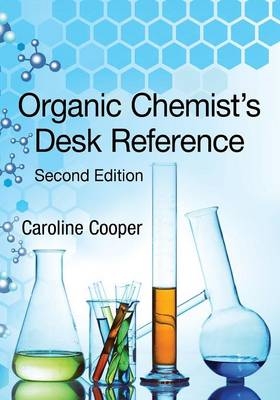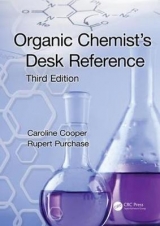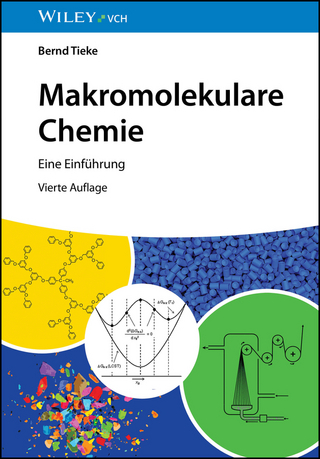
Organic Chemist's Desk Reference, Second Edition
Crc Press Inc (Verlag)
978-1-4398-1164-1 (ISBN)
- Titel erscheint in neuer Auflage
- Artikel merken
CHOICE Award Winner
Since the first publication in 1995, the Organic Chemist’s Desk Reference has been essential reading for laboratory chemists who need a concise guide to the essentials of organic chemistry — the literature, nomenclature, stereochemistry, spectroscopy, hazard information, and laboratory data. The past fifteen years have witnessed immense growth in the field of chemistry and new discoveries have continued to shape its progress. In addition, the distinction between organic chemistry and other disciplines such as biochemistry and materials science has become increasingly blurred. Extensively revised and updated, this new edition contains the very latest data that chemists need access to for experimentation and research.
New in the Second Edition:
Rearranged content placed in a logical progressive order, making subjects easier to find
Expanded topics from the glossary now presented as separate chapters
Updated information on many classic subjects such as mass spectrometry and infrared, ultraviolet, and nuclear magnetic resonance spectroscopy
New sections on chiral separations and crystallography
Cross references to a plethora of web information
Reflecting a 75% revision since the last edition, this volume is a must-have for organic chemists and those in related fields who need quick and easy access to vital information in the lab. It is also a valuable companion to the Dictionary of Organic Compounds, enabling readers to easily focus in on critical data.
Crowborough, UK
The Organic Chemistry Literature
Abstracting and Other Current Awareness Services
Principal Electronic Dictionaries
Useful Reference Works and Review Series
Patents, Including Patent Awareness Services
Cheminformatics Companies
Primary Journals
Endnotes
Nomenclature Fundamentals
IUPAC Nomenclature
CAS Nomenclature
Types of Name
Constructing a Systematic Name
Nomenclature of Ring Systems
Ring Systems (General)
Bridged Ring Systems
Spiro Compounds
Heterocyclic Ring Systems
Ring Assemblies
Ring Fusion Names
Nomenclature of Individual Classes of Compound
Carbohydrates
Alditols and Cyclitols
Amino Acids and Peptides
Natural Products (General)
Steroids
Lipids
Carotenoids
Lignans
Nucleotides and Nucleosides
Tetrapyrroles
Organoboron Compounds
Organophosphorus (and Organoarsenic) Compounds
Azo and Azoxy Compounds
Labelled Compounds
Tautomeric Compounds
Acronyms and Miscellaneous Terms Used in Describing Organic Molecules
Abbreviations and Acronyms for Reagents and Protecting Groups in Organic Chemistry
Glossary of Miscellaneous Terms and Techniques Used in
Nomenclature, Including Colloquial Terms
Stereochemistry
The Sequence Rule: R and S
Graphical and Textual Representations of Stereochemistry
Chiral Molecules with No Centres of Chirality
E and Z
The D,L-System
Descriptors and Terms Used in Stereochemistry
Graphical Representation of Organic Compounds
Zigzag Natta Projection
Stereochemistry
CAS Numbers, InChI, and Other Identifiers
CAS Registry Numbers
InChI
Simplified Molecular Input Line Entry System (SMILES)
Molecular Formulae
The Hill System
Chemical Abstracts Conventions
Checking Molecular Formulae
Chemical Hazard Information for the Laboratory
Hazard and Risk Assessment
Physical and Reactive Chemical Hazards
Health Hazards
Handling and Storage of Chemicals
Hazardous Reaction Mixtures
Disposal of Chemicals
Solvents
Peroxide-Forming Chemicals
Further Literature Sources
Spectroscopy
Infrared Spectroscopy
Ultraviolet Spectroscopy
Nuclear Magnetic Resonance Spectroscopy
Mass Spectrometry
Introduction
Ionisation Techniques and Mass Spectrometer Systems
Interpreting Mass Spectra and Molecular Mass
Sample Introduction and Solvent Systems for Electrospray Mass Spectrometry
Common Adducts and Contaminants in Mass Spectra
MALDI Matrices
Fragment Ions and Neutral Losses
Natural Abundance and Isotopic Masses of Selected Isotopes and Nuclear Particles
Glossary of Abbreviations and Terms Commonly Used in Mass Spectrometry
Crystallography
Introduction
Definitions
Crystallographic Point Groups
Space Groups
Reciprocal Lattice
Examples of Organic Crystals
CIF Data Format
Bragg’s Law and the X-Ray Spectrum
Crystal Specimen Preparation for X-Ray Analysis
Chromatographic Chiral Separation
Types of Molecular Interactions
Diastereomeric Compounds and Complexes
Chiral Mobile Phases
Chiral Stationary Phases
Laboratory Data and SI Units
Solvents
Buffer Solutions
Acid and Base Dissociation Constants
Resolving Agents
Freezing Mixtures
Materials Used for Heating Baths
Drying Agents
Pressure-Temperature Nomograph
SI Units
Languages
A German-English Dictionary
Russian and Greek Alphabets
SI Units
Index
| Erscheint lt. Verlag | 13.8.2010 |
|---|---|
| Zusatzinfo | 12/10 - replaced many pages - SEE NOTES!; 106 Tables, black and white; 227 Illustrations, black and white |
| Verlagsort | Bosa Roca |
| Sprache | englisch |
| Maße | 178 x 254 mm |
| Gewicht | 544 g |
| Themenwelt | Naturwissenschaften ► Chemie ► Organische Chemie |
| ISBN-10 | 1-4398-1164-4 / 1439811644 |
| ISBN-13 | 978-1-4398-1164-1 / 9781439811641 |
| Zustand | Neuware |
| Informationen gemäß Produktsicherheitsverordnung (GPSR) | |
| Haben Sie eine Frage zum Produkt? |
aus dem Bereich



